Intel Xeon E-2134 Benchmarks
For this exercise, we are using our legacy Linux-Bench scripts which help us see cross-platform “least common denominator” results we have been using for years as well as several results from our updated Linux-Bench2 scripts. At this point, our benchmarking sessions take days to run and we are generating well over a thousand data points. We are also running workloads for software companies that want to see how their software works on the latest hardware. As a result, this is a small sample of the data we are collecting and can share publicly. Our position is always that we are happy to provide some free data but we also have services to let companies run their own workloads in our lab, such as with our DemoEval service. What we do provide is an extremely controlled environment where we know every step is exactly the same and each run is done in a real-world data center, not a test bench.
We are going to show off a few results, and highlight a number of interesting data points in this article.
Python Linux 4.4.2 Kernel Compile Benchmark
This is one of the most requested benchmarks for STH over the past few years. The task was simple, we have a standard configuration file, the Linux 4.4.2 kernel from kernel.org, and make the standard auto-generated configuration utilizing every thread in the system. We are expressing results in terms of compiles per hour to make the results easier to read:
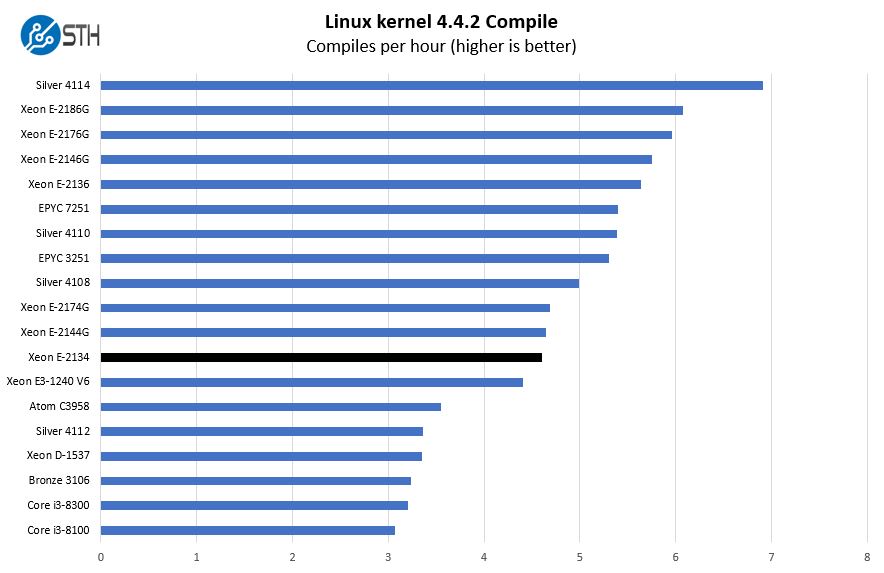
Here we wanted to point out a few items. First, the incremental generational performance improvement above the Intel Xeon E3-1240 V6 tends to be more than moving from the Intel Xeon E-2134 to the Intel Xeon E-2174G. We also wanted to point out that if you have a database application, for example, and do not need a Skylake-SP platform’s memory or PCIe connectivity, the Intel Xeon E-2134 offers much greater performance at a lower price point than the Intel Xeon Silver 4112.
c-ray 1.1 Performance
We have been using c-ray for our performance testing for years now. It is a ray tracing benchmark that is extremely popular to show differences in processors under multi-threaded workloads. We are going to use our 8K results which work well at this end of the performance spectrum.
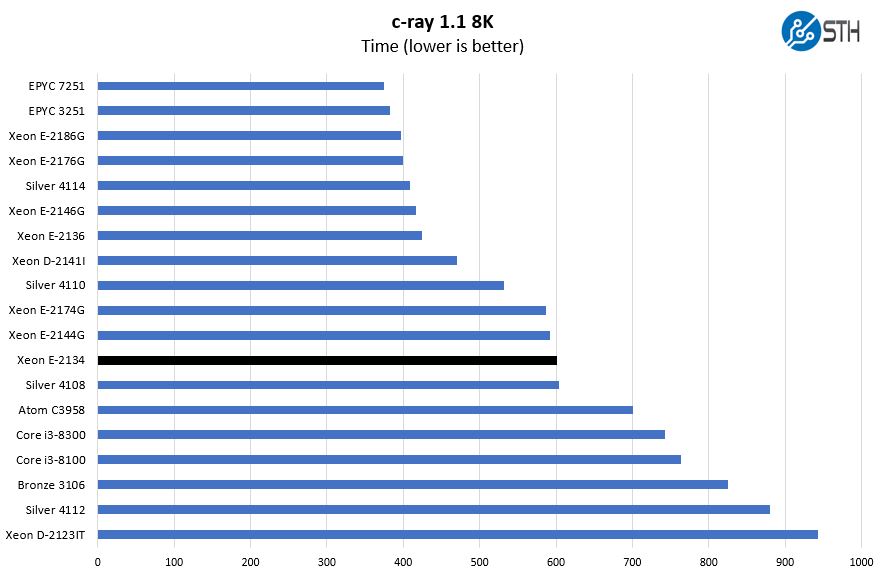
Here the higher clock speeds and architectural cache tweaks allow the Intel Xeon E-2134 to outpace the Intel Xeon Silver 4108. This is an example of why clock speed matters and one cannot simply buy a CPU based on core count.
7-zip Compression Performance
7-zip is a widely used compression/ decompression program that works cross-platform. We started using the program during our early days with Windows testing. It is now part of Linux-Bench.
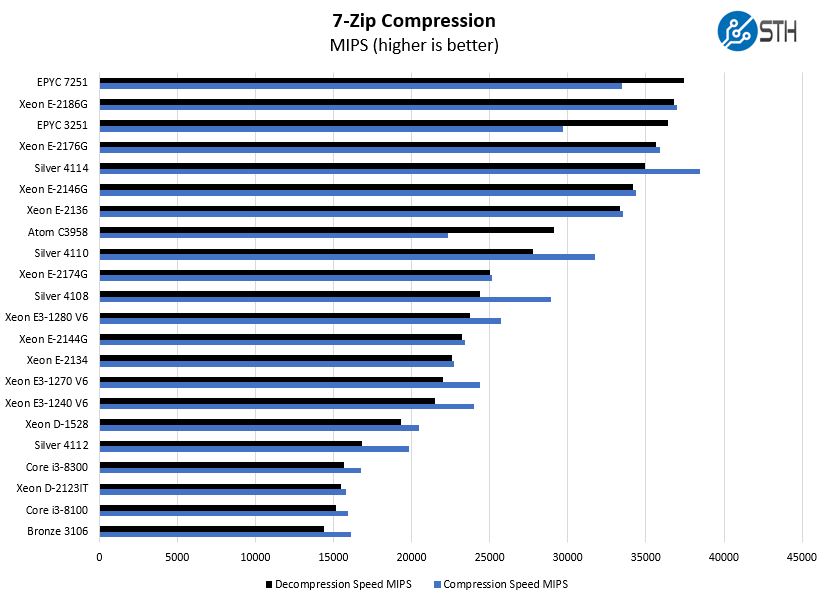
An interesting trend here is that the decompression to compression speed ratio with the Intel Xeon E-2100 series tends to be much closer than with the previous generation Intel Xeon E3-1200 V6 generation or the Skylake-SP CPUs like the Intel Xeon Silver 4110.
NAMD Performance
NAMD is a molecular modeling benchmark developed by the Theoretical and Computational Biophysics Group in the Beckman Institute for Advanced Science and Technology at the University of Illinois at Urbana-Champaign. More information on the benchmark can be found here. With GROMACS we have been working hard to support Intel’s AVX-512 and AVX2 supporting AMD Zen architecture. Here are the comparison results for the legacy data set:
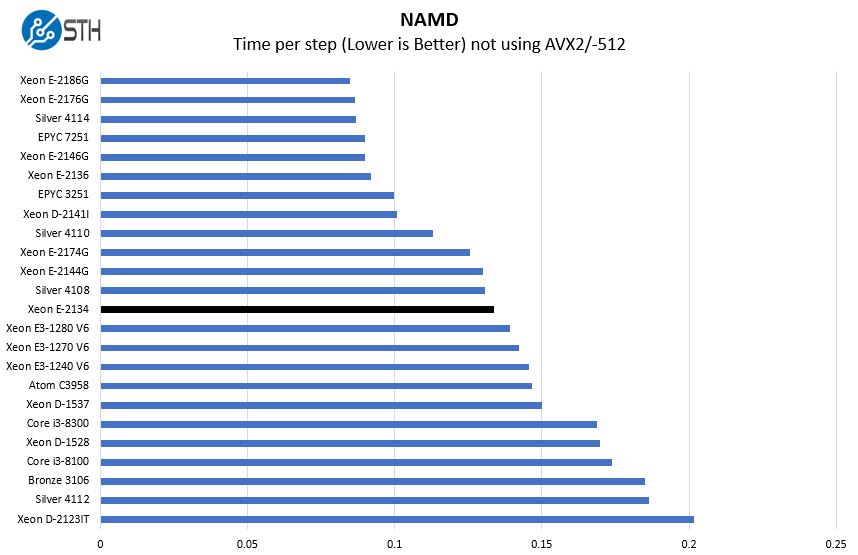
Here again, we see result clusters where the quad-core parts like the Intel Xeon E-2134 are grouped. We also see clusters of results with the six core parts like the Intel Xeon E-2146G providing a much higher level of performance.
Sysbench CPU test
Sysbench is another one of those widely used Linux benchmarks. We specifically are using the CPU test, not the OLTP test that we use for some storage testing.
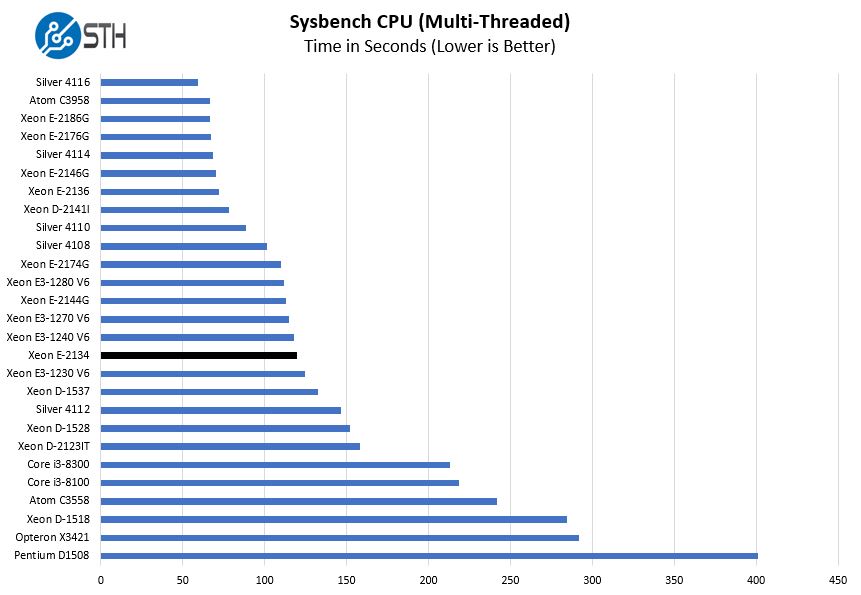
One of the larger notes is that we see performance somewhat better than the previous generation Intel Xeon E3-1230 V6. The Intel Xeon E-2134 is a generational price level replacement for the Xeon E3-1230 V6 making this especially relevant.
OpenSSL Performance
OpenSSL is widely used to secure communications between servers. This is an important protocol in many server stacks. We first look at our sign tests:
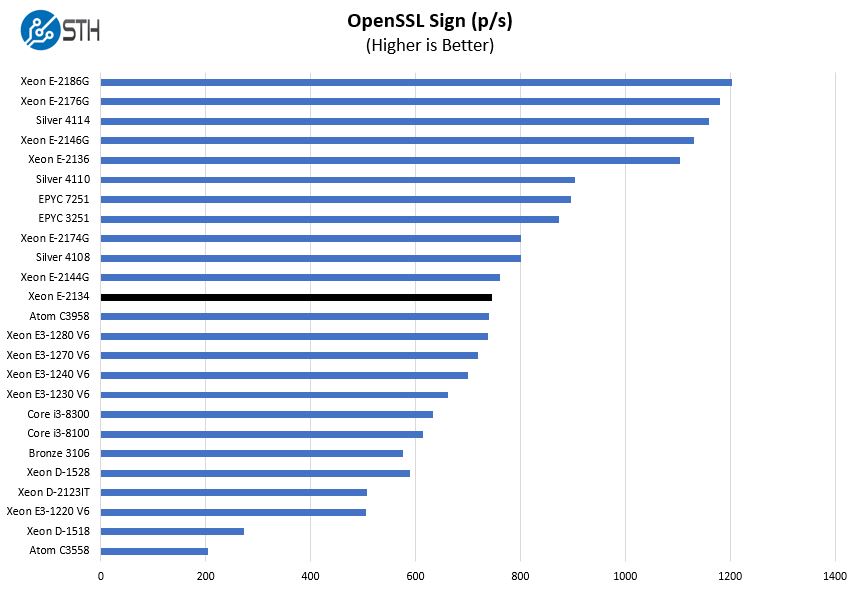
Here are the verify results:
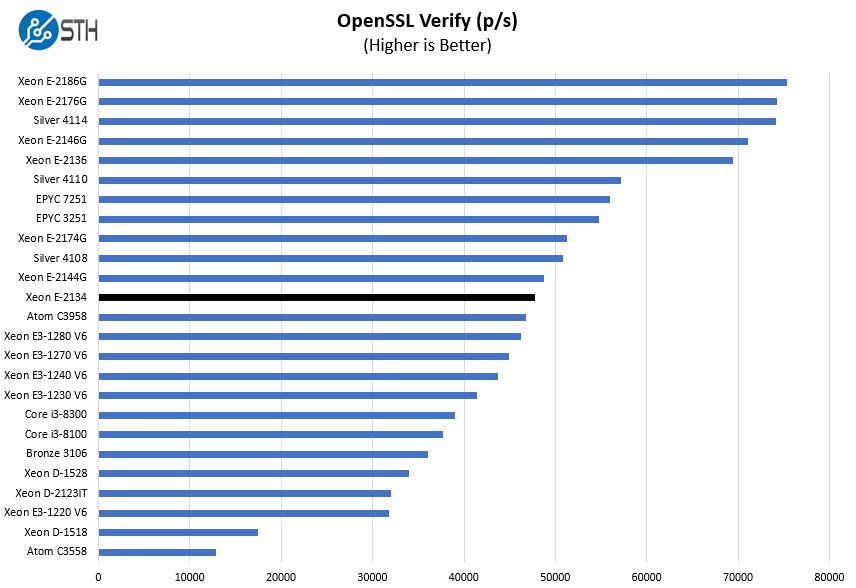
This is a case where the Intel Xeon E-2134 outperforms all of the Intel Xeon E3-1200 V6 CPUs that we tested including the top-end Intel Xeon E3-1280 V6.
UnixBench Dhrystone 2 and Whetstone Benchmarks
Some of the longest-running tests at STH are the venerable UnixBench 5.1.3 Dhrystone 2 and Whetstone results. They are certainly aging, however, we constantly get requests for them, and many angry notes when we leave them out. UnixBench is widely used so we are including it in this data set. Here are the Dhrystone 2 results:
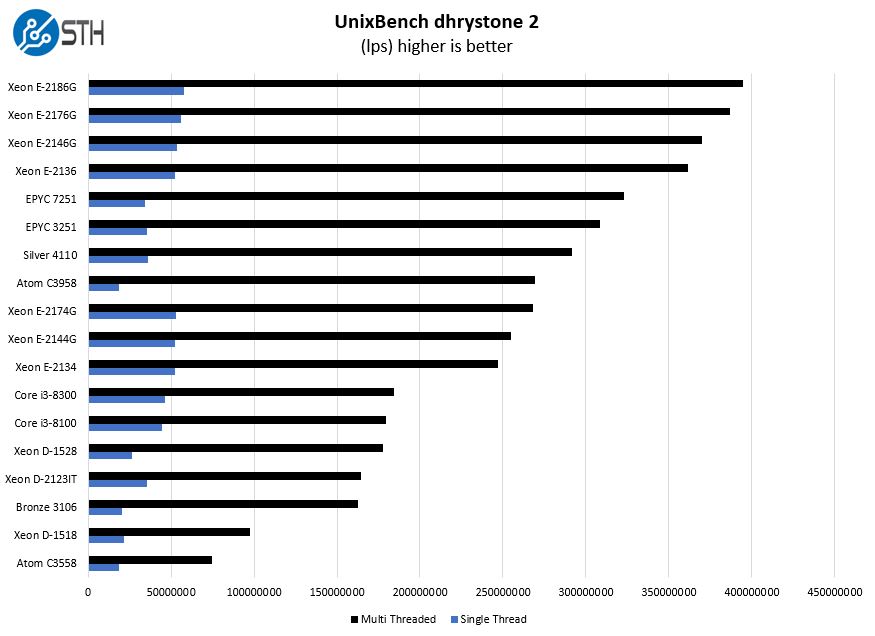
Here are the whetstone results:
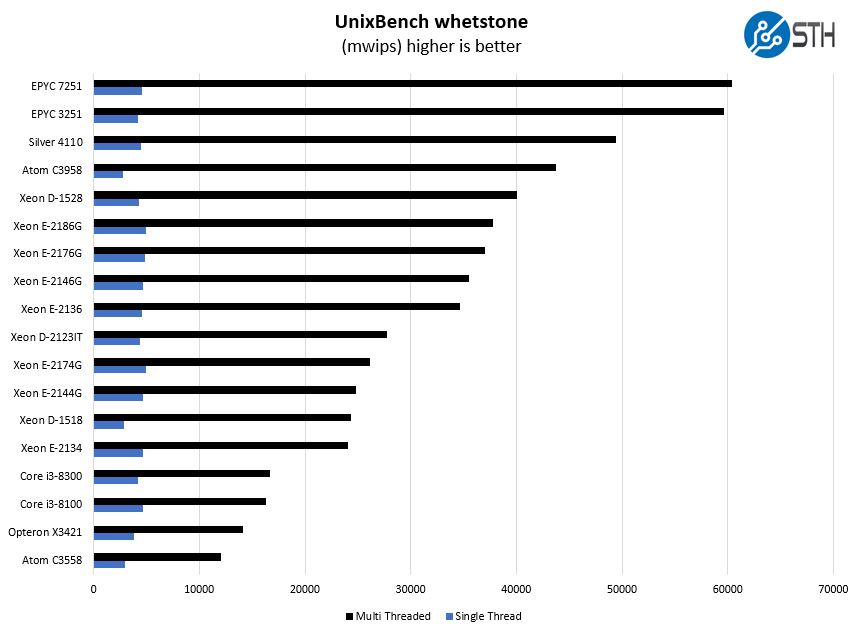
Adding hyper-threading means that one gets significantly more performance in the Intel Xeon E-2134 over the Core i3 series. The jump can be as much as twice the CPU cost, but as one can see the results can be worth it as on a system basis the increment is generally under 10-15%.
GROMACS STH Small AVX2/ AVX-512 Enabled
We have a small GROMACS molecule simulation we previewed in the first AMD EPYC 7601 Linux benchmarks piece. In Linux-Bench2 we are using a “small” test for single and dual socket capable machines. Our medium test is more appropriate for higher-end dual and quad socket machines. Our GROMACS test will use the AVX-512 and AVX2 extensions if available.
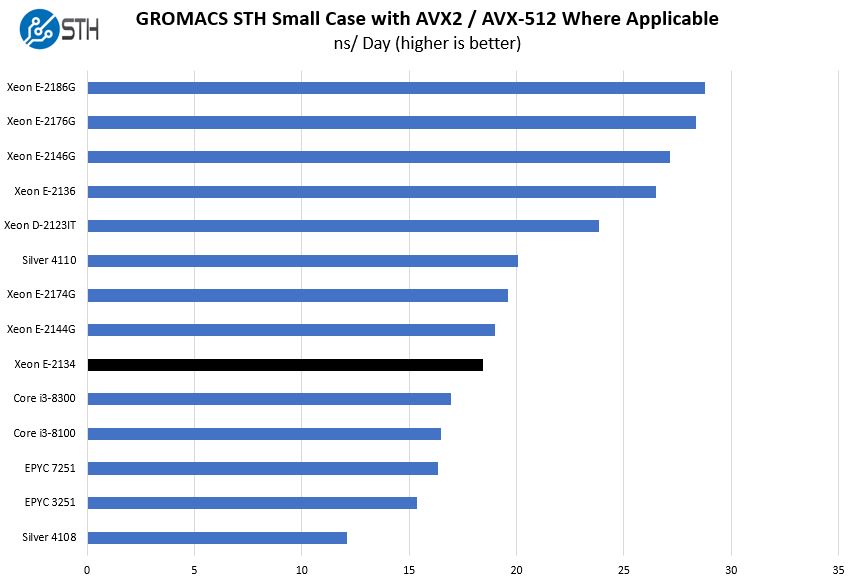
Sporting high clock speeds but missing dual port AVX-512 execution on the Xeon E-2134 means that the lower clocked Intel Xeon D-2123IT is much faster here.
Chess Benchmarking
Chess is an interesting use case since it has almost unlimited complexity. Over the years, we have received a number of requests to bring back chess benchmarking. We have been profiling systems and are ready to start sharing results:
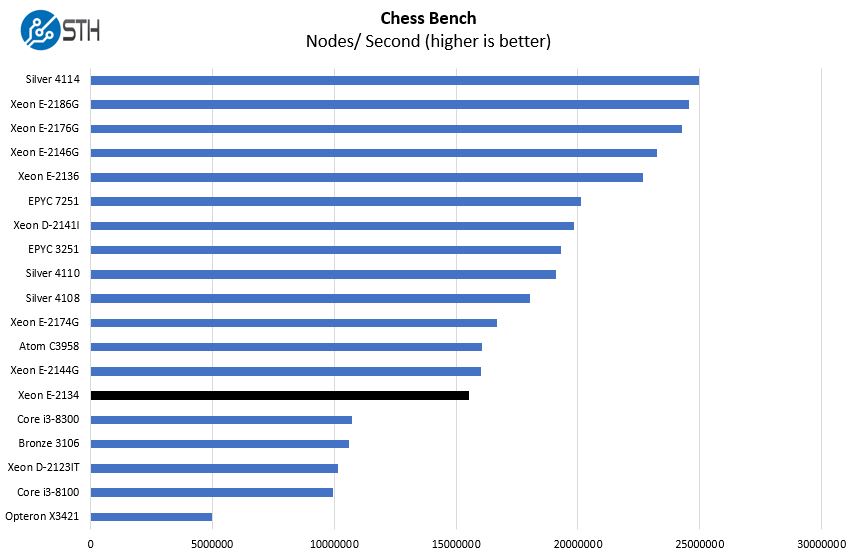
With lower core counts, one can be extremely successful having high clock speeds. Again, for $35 more or so, the Intel Xeon E-2136 offers similar clock speeds with more performance.
Next, we are going to have the power consumption, market positioning, and our final words.




It’s refreshing to see a hardware site honestly say don’t buy this. OK well maybe it’s more don’t buy this unless you can’t spend a few dollars more and only then. At least that’s honest.
So, Whats new ?, Another 4 core CPU, much identical architecture & performance, Wow, Intel is actually reinventing itself.
Seriously, I cannot figure it out. In my area of expertise I have to advice a company owning a large server farm In matters of upgrading hardware.
why would I want to justify purchasing such hardware over the previous hardware? I do not see the technological advancement here.
I’m glad you’re telling the truth, and that this is not just another sympathetic article.